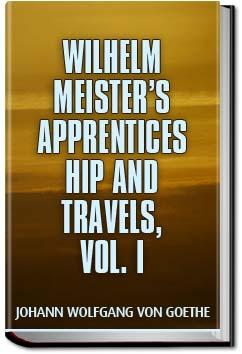UNLIMITED Audiobooks and eBooks
Over 40,000 books & works on all major devices
Get ALL YOU CAN for FREE for 30 days!
Wilhelm Meister's Apprenticeship and Travels, Vol. I
Johann Wolfgang von Goethe
How does All You Can Books work?
All You Can Books gives you UNLIMITED access to over 40,000 Audiobooks, eBooks, and Foreign Language courses. Download as many audiobooks, ebooks, language audio courses, and language e-workbooks as you want during the FREE trial and it's all yours to keep even if you cancel during the FREE trial. The service works on any major device including computers, smartphones, music players, e-readers, and tablets. You can try the service for FREE for 30 days then it's just $19.99 per month after that. So for the price everyone else charges for just 1 book, we offer you UNLIMITED audio books, e-books and language courses to download and enjoy as you please. No restrictions.
Wilhelm walked up and down the streets for a time: he heard a sound of clarinets, hunting-horns, and bassoons; it swelled his bosom with delightful feelings. It was some travelling showmen that produced this pleasant music. He spoke with them: for a piece of coin they followed[71] him to Mariana's house. The space in front of the door was adorned with lofty trees; under them he placed his artists; and, himself resting on a bench at some distance, he surrendered his mind without restraint to the hovering tones which floated round him in the cool mellow night. Stretched out beneath the kind stars, he felt his existence like a golden dream. "She, too, hears these flutes," said he within his heart: "she feels whose remembrance, whose love of . . . Read More
Try now for FREE!

"Love your service - thanks so much for what you do!"
- Customer Cathryn Mazer
"I did not realize that you would have so many audio books I would enjoy"
- Customer Sharon Morrison
"For all my fellow Audio Book & E-Book regulars:
This is about as close to nirvana as I have found!"
- Twitter post from @bobbyekat



Community Reviews
I wouldn't have thought about reading Goethe if we hadn't been sitting in the rain last November talking about Nietzsche, and we wouldn't have been talking about Nietzsche if Helen hadn't been trying to explain Steiner to me for the hundredth time, and she wouldn't have been trying to explain Steine
Ben Jonson, observing that certain actors credited his rival, Shakespeare, with never blotting out a word of his writing, retorted "Would he had blotted out a thousand!" Wilhelm Meister's Apprenticeship, from a modern perspective,would benefit from easily ten times that many deletions.
Clearly this i
The English version can be found below.
-----------
German Version:
Großer Klassiker, aber nicht wirklich mein Geschmack!
Gesamt: 2,5.
----------
English version:
Great classic, but not really my taste!
Overall: 2.5.
I’ve read most of Goethe's major work at this point, and I’ve not found a single one of them to be completely satisfying. There is always too much of something or not enough of something, and this book is no exception.
I daresay most modern readers will find this work problematic. On the levels of c
Esta novela clásica de Johann Wolfgang von Goethe sirvió de inspiración para las principales figuras filosóficas y literarias de la época, entre ellos Schiller, Fichte, Hegel, Schlegel, Schleiermacher y Novalis. Un texto que aborda la cuestión relacionado con problemas y temas de la vida humana de m
Majster je toliko toga! Najpre je temelj za svakoga ko se interesuje za Bildungs-narative i filozofiju obrazovanja. Nemoguće je i neozbiljno govoriti o poetici Bildungsromana bez čitanja Getea. Tako i samo čitanje ima obrazovnu ulogu – upoznajemo se sa kodom, obuhvatom i mogućnostima ovakve vrste ro
Die Herkunft aus gutem Haus, der Drang zur Selbstverwirklichung, der verschlungene Lebensweg: Wilhelm Meister hat einiges mit seinem Erfinder Johann Wolfgang von Goethe gemeinsam. In die Form eines Romans gepresst, weicht Goethes Lebensschilderung doch stark von dem handlungsgetragenen Schema ab, da
This is the prototypical Bildungsroman - the influence of "Wilhelm Meister" on global literary history can hardly be overestimated, because with this text from 1795, Goethe defined the genre. The central aspect he highlighted is that "Bildung" does not only entail formal education, but also the deve